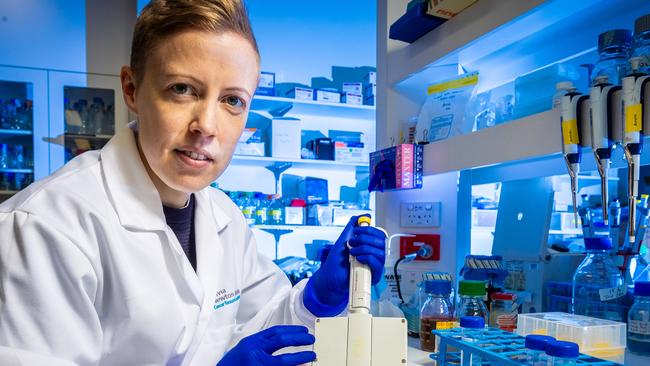Award-winning researcher shows how T cells can fight melanoma
A conversation over pizza delivered a career change for melanoma scientist Emily Lelliott after her mentor told her to “do something more interesting” with her life.
News
Don't miss out on the headlines from News. Followed categories will be added to My News.
One of the country’s most promising young melanoma researchers is helping to shift the thinking on future cancer treatments.
Now a postdoctoral fellow at the Olivia Newton John Cancer Research Institute in Melbourne, Emily Lelliott, 35, is investigating T cells and how they can offer new therapies to treat deadly cancers like melanoma.
T cells are part of the immune system tasked with helping protect the body from infection and disease.
Dr Lelliott was recently recognised with the top prize at the Premier’s Awards for Health and Medical Research for her work.
The award described how Dr Lelliott’s discoveries revealed that therapies initially designed to target melanoma cells also significantly enhanced the cancer-fighting capacity of T cells.
It added that her research has opened a new area of focus and has also influenced the design of clinical trials, not only for melanoma treatment but also for other types of cancer.
The citation went on to say that through her research Dr Lelliott is offering hope and ultimately saving more lives.
While her work is certainly reshaping the research landscape, it is also very personal.
Dr Lelliott’s mentor and her first boss died from melanoma in 2012. Ben Strada owned the pizza shop where she worked during her senior high school years and through university in Sydney.
“Ben challenged me to do something with my life,” Dr Lelliott said.
She had originally graduated with a commerce degree, but said Mr Strada was a little disappointed.

“He thought I was going to do something more interesting for a career, like learn to regrow human limbs,” she said.
“We had talked about that over the years, debated it; I said I thought scientists would achieve that one day, he pushed me to explain why.
“He was like a big brother to me and gave me a lot of perspective on life. I missed that when he passed away, but I had a light-bulb moment and changed career paths.”
Mr Strada had a melanoma removed some years earlier, but he started having breathing issues. Dr Lelliott said scans revealed he had metastatic melanoma that had spread to the lungs and brain.
She set about researching her friend’s treatment options and became fascinated with how the immune system worked.
Dr Lelliott didn’t know it then, but she had found a new career path.
“It was a big risk,” she said. “But I knew I had to go back to university to do a science degree.”
After four years of study Dr Lelliott moved to Melbourne from Sydney to do her PhD, completing a further five years of training under the supervision of one of the country’s best cancer experts, Professor Grant McArthur at the Peter MacCallum Cancer Centre.
She is now firmly committed to a career in research saying she enjoys that it is unpredictable and that’s what makes a project good.
“What I try to do in terms of my career and moving forward is remain flexible and create opportunities for myself,” Dr Lelliott said.
Delighted to have been named as the recipient for the Premier’s Awards for Health and Medical Research, she is now focused on researching the immune system and dissecting how it interacts with cancer to design new therapies.
While Mr Strada did not live to see just how well his protégé would do, she suspects he would be proud.
“I think Ben would definitely be proud of what I am doing now; this is what he meant that I should be doing,” she said.





